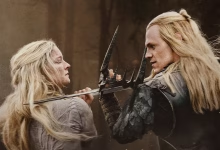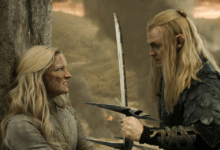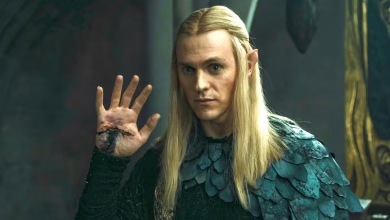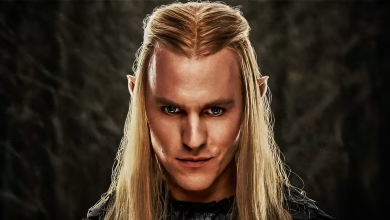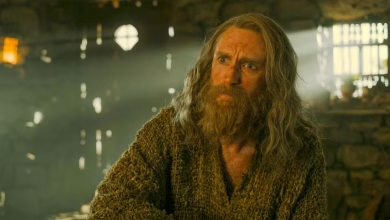‘Mistborn’ Author Brandon Sanderson Shares His Thoughts On ‘The Lord Of The Rings: The Rings Of Power’: “We Do Not Need Hobbits Talking About Murdering Other Hobbits”
Mistborn novelist Brandon Sanderson shared his thoughts on Prime Video’s The Lord of the Rings: The Rings of Power describing the first season as “fairly mediocre.”

Speaking with his co-host Dan Wells, Sanderson said, “You might expect from my previous episodes talking, I am not as high on it as you are. My end opinion of it was meh. I thought it was fairly mediocre.”
He elaborated, “Some strong elements. Some very weak elements that I think are towing it down. And the good elements were mostly bungled, I felt.”

Sanderson specifically took issue with the Harfoots, “The big one for me is the Harfoots. The Harfoots, I feel, were just utterly bungled. And my feeling on this is that I can feel what they probably should have been doing and at least in one draft probably were doing, which is this is the more light-hearted side of this. We want you to walk out of this loving the Harfoots and understanding why not-Gandalf has a bond with the Hobbits many hundreds of years later.
“And if you look at what they say that all works. No one walks alone. In the end we will do what’s right, you know, and help the Stranger. All of that stuff,” he explained. “But the bulk of their … in these last episodes there was a woman who comes to the guy in charge and says, ‘It’s time to execute them. Let’s take their wheels and make them die.’ Like what are you thinking? We do not need Hobbits talking about murdering other Hobbits. And this is our second time.”

“It’s so baffling and then they only accept the Stranger in after he proves useful. There’s no big-heartedness to that. That is pure utilitarianism. ‘Well, if he’s useful to us then,’” Sanderson asserted.
Moving to the last episode, Sanderson said, “And then in the last episode where [the Harfoots] are like, ‘All right we’ll go help your friend.’ Like why? You haven’t built to this. There’s nothing … Completely unearned. Completely unearned.”

Sanderson did note he enjoyed Nori’s character, “Nori is delightful. Nori really is great all the way through. And I see in her narrative a built-in sort of — I don’t know.”
He then abruptly changed gears and detailed what he would have done, “This is what it should have been. I wanted, looking in retrospect, episodes one or two she hides The Stranger. Episodes three or four they are very worried about The Stranger, they talk amongst themselves, they decide to leave him behind, but then they can’t do it because they are kind-hearted and he is one of them. Not because he is useful, not because he has magical power. They bring him along.”
“Near the end he does this thing with the magic that they are all scared of, but then they still welcome him in, reaffirming, you know, maybe he runs off on his own because he’s scared of what he might have done to them and they all band together and say, ‘No, he’s one of us and we need to protect him’ and then go after him,” Sanderson continued. “That’s the arc that’s so easy. It’s so simple. It’s so obvious.”
Sanderson then shared, “You need to cut the whole thing of leaving Nori’s family behind. It’s just ridiculous. But this seems the most obvious plot in the whole thing and a surefire crowd pleaser and makes us love the Harfoots as we should. They don’t need to be shades of grey. Everyone else can be. We don’t need grimdark Hobbits. We really do not need grimdark Hobbits.”

Later in the podcast, Sanderson shared his thoughts on the three villainous characters that were tracking the Hobbits believing the Stranger to be Sauron.
He said, “They obviously weren’t very smart because for instance they’re looking for Gandalf, they find a bunch of Hobbits who have been hanging out with him and they don’t interrogate them. Beyond that, if you’re mistaking Gandalf for Sauron then, you know, like we weren’t fooled so the fact that they were doesn’t speak highly for their powers of observation, shall we say.”

Still later, Sanderson said he laughed when the Númenóreans sailed to Mordor, “We were laughing about that so much because they said, ‘We’re gonna bring 500 people.’ and as they were sailing out I said, ‘How many people you count on those boats?’”
He continued, “This is part of the problem. I was laughing too much at the show to give it higher. Like I ended up I’m like I’m six out of ten. I was laughing at it too much to give it anything higher than that. They showed the one horse being craned over. I’m like, ‘All right, where are the rest of the horses?’ And then they go below decks and there’s no horses.”
Next, he took issue with the Númenórean cavalry charge against the Orcs of Mordor, “And they show a cavalry charge to get there. This was ridiculous on the level of having a cavalry charge into darkness in Game of Thrones. So they land, they don’t know this place is being attacked. They have no idea. They ride their horses in full armor at a gallop to get to a place they don’t know is under attack. Number one, you just can’t do that even if they were under attack. Your horses would arrive useless.”

Sanderson then went on to call out the show’s military tactics, “Since we’re on ridiculous military tactics, what do you think about leaving your fortification behind with walls and towers to go to a village to hold off an invading army. A village with holes in the ground that that army came out of. What do you think of that as a tactical decision?”
“They leave their fortification because they’re like well that tower might fall down that’s never been established that it might fall down before as I recall,” he added.

Next, Sanderson took issue with the creation of Mordor through a sword being inserted into a keyhole that breaks a dam and allows water to flow into a volcano creating a massive explosion.
“Look, having a magical doomsday device sort of thing, okay, right,” he said. “Sauron, in the past, built this thing because the river wasn’t dammed yet and they needed the river to get enough water to cause the eruption that he wants to cause and he can’t release it until there are pits dug in specific places. So he puts his plan into motion to gather up the water, build me a dam, then dig these channels while the water is filling up, then we’ll let loose the big torrent of water, and we have the mountain.”
“It’s a little bit Doctor Evil,” Sanderson continued. “It’s a little bit here’s my really weird intricate plan. I can buy that in a fantasy story.”

However, he then returned to the humans discarding the tower for the village, “What I don’t buy is you have a bunch of untrained peasants. Well, one thing you know is if you have untrained peasants, fortifications are a force multiplier for them. If all they have to do is shove ladders and don’t have to actually fight, they become super effective compared to putting them in ranks in front of Orcs and telling them to fight. It’s so ridiculous.”
Sanderson did note he thought the battle at the village after they had abandoned the tower was “really good.” He explained, “What made that really good was that they were using their own people against them. And so it’s reasonable that they’re at an equal skill level and that our side could win. The same argument that I was making before actually applies well to this one. Because if you’ve got a bunch of untrained peasants fighting each other, they’re not going to know to form battle ranks, and they don’t.”
Sanderson then took issue with the brutality and gruesomeness of the show especially during this battle sequence, “If you’re gonna have a TV-14 show, do we need pulling the stick out of an orc’s eye while he bleeds onto your face levels of gore? I think they went too far as someone who in his books I feel has gone too far before.”

The character of Adar was another positive for Sanderson. He said, “Adar was great. I was uncertain about the you’re building sympathy for him, but he makes a man murder a random child. But then after I put together the plan of, ‘No, you’re planning to entrust this guy with the sword.’ You need to know that guy is not a spy. How do you make sure he’s not a spy? You see what he does when you make him kill one of his own.”

Sanderson went on to tout the scene where Halbrand stabs Adar’s hand after the Númenóreans rout the Orcs and questions him, “Do you remember me?”
“Since we’re talking about good things here, the scene where Sauron says, ‘Do you recognize me?’ And he’s like, ‘No.’ It’s trying to imply that Halbrand lost family to this guy. After that scene I said to Emily that was a really good scene because he’s still Sauron, I’m almost 100% sure of it. What they are doing is they’re establishing he’s mad at this guy because this guy betrayed him and that he has a new face. And they did that while actually to most audiences implying this guy killed his family and he’s mad at him for that reason.
“And so they got two crucial bits of foreshadowing with a really nice red herring. That’s their best red herring moment,” Sanderson detailed.
